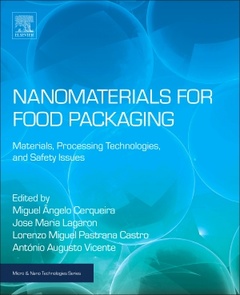Nanomaterials for Food Packaging Materials, Processing Technologies, and Safety Issues Micro and Nano Technologies Series
Coordonnateurs : Cerqueira Miguel Angelo Parente Ribei, Lagaron Jose Maria, Pastrana Castro Lorenzo Miguel, Oliveira Soares Vicente Antonio Augusto Martins de

Nanotechnology for Food Packaging: Materials, Processing Technologies, and Safety Issues showcases the latest research in the use of nanotechnology in food packaging, providing an in-depth and interdisciplinary overview of the field. Nanoscale advances in materials science, processing technology and analytical techniques have led to the introduction of new, cheaper and safer packaging techniques. Simultaneously, the increasing use of renewable nanomaterials has made food packaging more sustainable. Chapters provide a comprehensive review on materials used, their structure?function relationship, and new processing technologies for the application and production of nanotechnology-based packaging materials.
In addition, the book discusses the use of functional materials for the development of active, smart and intelligent packaging, possible migration and toxicity of nanomaterials for foods and regulatory aspects, and commercial applications.
2. Inorganic-based nanostructures and their use in food packaging (clays, silica, Ag)
3. Cellulose-based nanostructures and their use in food packaging (nanocrystal, nanowhiskers, nanofibers)
4. Bio-based nanocomposites (starch nanocrystal, chitosan nanoparticles, proteins, polysaccharides, PHB, PLA)
5. Structure–property relationships in polymer nanocomposites for food packaging
6. Production and processing of nanocomposites (melting extrusion, film-bowing, new challenges)
7. Nanostructured multilayer films (Layer-by-layer, electrospinning)
8. Active and smart packaging (antimicrobial nanocomposites, loaded nanostructures, scavenging, examples)
9. Intelligent packaging (sensors, detection of molecules, examples)
10. Potential migration of nanocomposites for foods (used testes, examples, challenges)
11. Safety and regulatory issues (health, environmental aspects)
12. Commercial applications (products in the market, patents)
Materials Scientists, and Nanoscientists working in the area of packaging technology, health & safety and sustainability.
Jose Maria Lagaron is currently Senior Research Scientist and Project-Leader at the Packaging Lab. of the Institute of Agrochemistry and Food Technology (IATA) of the Superior Spanish Council for Scientific Research (CSIC), and Lecturer of Materials Science at the Department of Technology, Polymers Group of the Area of Materials of the University Jaume I in Castellón, Spain
Lorenzo Pastrana has a PhD in Pharmacy and is full Professor of Food Science at the University of Vigo, Spain. He has 25 years’ experience in research and teaching in the areas of Food Processing, Biotechnology and Bionanotechnology. He is currently the head of the Department of Life Sciences at INL. He is author of more than 120 scientific papers and PI of more than 30 National and European research projects. He is the author of seven patents (four of which are licensed), related to the development of new food products and process as well.
António Augusto Martins de Oliveira Soares Vicente is an Associate Professor at the Centre of Biological Engineering, University of Minho, Braga, Portugal. His research focuses on developing functionalized nanostructured d
- Provides detailed information on the use of nanomaterials and methodologies in food packaging, possible applications and regulatory barriers to commercialization
- Presents an interdisciplinary approach that brings together materials science, bioscience, and the industrial and regulatory aspects of the creation and uses of food packaging
- Helps those undertaking research and development in food packaging gain a cogent understanding on how nanotechnology is leading to the emergence of new packaging technologies
Date de parution : 05-2018
Ouvrage de 346 p.
19x23.3 cm
Thème de Nanomaterials for Food Packaging :
Mots-clés :
Active packaging; Antimicrobial coating; Antimicrobial packaging; Biocomposites; Bionanocomposites; Biopolymers; Block copolymer; Blow molding; Butadiene-ethyl acrylate-methyl methacrylate-styrene copolymer; Carbon black; Cellulose; Chitosan; Coating; Coextrusion; Compounding; Data carriers; Detection techniques; Dispersion; Electrospinning; Ethylene scavenger; Extrusion; Food; Food packaging; Food spoilage; Functional inks; Indicators; Injection molding; Inorganic nanoparticles; Intelligent food packaging; Kaolin clay-polyacrylic acid sodium salt; Lamination; Layer by layer; Lignocellulosic; Market; Mathematical models; Melt rheology; Migration; Migration test; Modified atmospheric packaging; Modified bentonite; Modified montmorillonite clay; Nanocoatings; Nanocomposites; Nanolayers; Nanomaterials; Nanoscale; Nanosensors; Nanostructure; Nanotechnology; Oxygen scavenger; Packaging; PHA; PLA; Polymer-clay nanocomposites; Printed electronics; Regulations; Safety; Safety assessment; Sensors; Shelf life; Silicon dioxide; Starch; Surface engineering; Thermoforming; Titanium nitride; Toxicity; Zinc oxide


